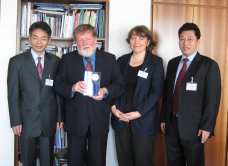
The UNESCO-UNEVOC International Centre: Who We Are | What We Do | Working With Us | Get in Touch
The UNEVOC Network: Learn About the Network | UNEVOC Network Directory
For Members: UNEVOC Centre Dashboard
Thematic Areas: Inclusion and Youth | Digital Transformation | Private Sector Engagement | SDGs and Greening TVET
Our Key Programmes & Projects: BILT: Bridging Innovation and Learning in TVET | Building TVET resilience | TVET Leadership Programme | WYSD: World Youth Skills Day
Past Activities: COVID-19 response | i-hubs project | TVET Global Forums | Virtual Conferences | YEM Knowledge Portal
Our Services & Resources: Publications | TVET Forum | TVET Country Profiles | TVETipedia Glossary | Innovative and Promising Practices | Toolkits for TVET Providers | Entrepreneurial Learning Guide
Events: Major TVET Events | UNEVOC Network News
of representatives of UNEVOC Centres in China and Australia
 On 25-28 September 2007, UNESCO-UNEVOC hosts representatives from two UNEVOC Centres: Faculty of Education, Griffith University, Brisbane, Australia, and Zhenjiang Technology Institute of Economy (ZJTIE), Hangzhou Zhejiang Province, China.
On 25-28 September 2007, UNESCO-UNEVOC hosts representatives from two UNEVOC Centres: Faculty of Education, Griffith University, Brisbane, Australia, and Zhenjiang Technology Institute of Economy (ZJTIE), Hangzhou Zhejiang Province, China.
The visit is a follow-up to a visit of the director of UNESCO-UNEVOC, Rupert Maclean, and Dr Margarita Pavlova, Faculty of Education, Griffith University, to ZJTIE in April 2007.
While in Bonn, Professor Lineng Chen and Professor Chun Lin Huang from ZJTIE will work on a research project on “Developing Innovative Approaches to Education for Sustainable Development: TVET Curriculum Reform in China”.
This research project focuses on facilitating curriculum reform in TVET in China through the development of contextually-based, innovative approaches to teaching and learning of issues relevant for sustainable development.
The project will involve academics, policy makers and administrative staff from institutes in different regions in China that represent the diversity of TVET contexts: western and eastern provinces, developed and less developed provinces, urban and rural areas. The project will focus on researching conditions and approaches required for initiating and supporting curriculum reform in the area of educating for sustainable development.
Contact